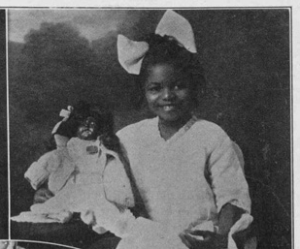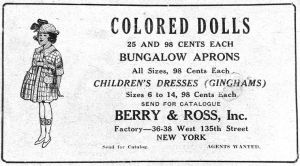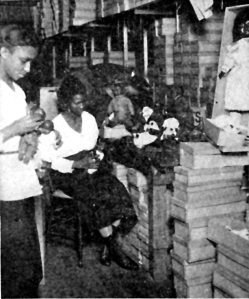Address by Marcus Garvey at the Palace Casino
[Negro World, 21 June 1919]
Over three thousand persons, members and friends of the Universal Negro Improvement Association, assembled at the Palace Casino, 135th street and Madison Avenue, New York City, Sunday evening, June 15, to greet Mr. Marcus Garvey, president-general and International Organizer of the association, who has just returned to the city after an extended lecture in Michigan, Virginia and Canada.
Mr. Edgar M. Grey, general secretary of the association, called the meeting to order a few minutes after nine o’clock, by the singing of the opening hymn, “From Greenland’s Icy Mountains.” After a few brief remarks by the chairman, a musical program consisting of one violin solo by Master William Wilkinson, and a piano solo by Miss Irene Callender was rendered. Mr. George Tobias, treasurer of the association, was next presented to the
audience and surprised his hearers and friends by revealing unsuspected talent as a reader, when he gave an impressive rendition of Wendell Phillips’ great oration on Toussaint L’Ouverture.

The next speaker introduced was Miss Henrietta Vinton Davis, the popular and talented elocutionist ofWashington, D.C., who, as a tribute to the children who had so splendidly entertained for the evening, recited a poem entitled “Little Brown Baby with Sparkling Eyes,” written by Paul Lawrence Dunbar, poet laureate of the Negro Race.
In order to make the recitation as realistic as possible, Miss Davis used for the occasion a large colored doll manufactured by Berry & Ross, who had very kindly loaned it for the occasion. At the end of the recitation Miss Davis made a stirring appeal for support for the factory that was doing so much to inculcate a spirit of race pride in the Negro race.

Following this the chairman asked for a silver collection, which was heartily and liberally responded to. Taking as his theme, the subject of race pride, the chairman then made a few short and cryptic remarks in which he pointed out that the principal concern of the race was not so much in finding out how to die but in learning how to live.
At the close of his address the chairman then introduced as the next speaker the person whose commanding personality was responsible for the vast assemblage that evening, Mr. Marcus Garvey. Mr. Garvey began his address by thanking all those who had supported the officers of the association, while he was absent touring the West, Canada and the South. He then told how efforts were being made by enemies of the association to discredit both himself and the organization. He specifically named Mr. William Bridges, editor of the “Challenge Magazine,” and a well known stepladder orator on Lenox avenue, as having assailed him in many ways while he was away. On his return to the city he had taken up the gauntlet and challenged the editor of the “Challenge” to meet him in open debate, which Mr. Bridges at first declined, but under pressure of public opinion was compelled to accept. Mr. Garvey then outlined the debate which had taken place the night before at the corner of 138th street and Lenox avenue, and which he assured his audience resulted in the complete and inglorious defeat of his opponent. The speaker also told of the plots engineered against himself and the organization by a cabal of envious and malicious individuals, who being incapable of thinking internationally, were doing everything of an underhand nature to wreck the organization; but inasmuch as the organization had firmly established itself in a majority of the States of the Union, the islands of West Indies, several republics of South and Central America and on the west coast of Africa, it was next to impossible for any group of men or any government to entirely destroy it. He was there that evening, he said, for the purpose of defending himself and the organization, and to give a detailed explanation of the feasibility of the Black Star Line project.
He then roused his audience to the highest pitch of enthusiasm when he recited to them the prowess of the Black race and how it was possible for the scattered millions of Negroes all over the world to accomplish the liberation of Africa by supporting the plans of the Universal Negro Improvement Association and African Communities League. Dramatically striking his chest, Mr. Garvey convincingly assured his hearers that all cowardice had departed from his anatomy, “for,” he said, “if I could have died on the field of Flanders of France in the white man’s cause, I can die in America fighting for myself and my race.” At this a storm of applause rent the building. Men and women rose to their feet and handkerchiefs were waved over head as every individual vied with his neighbor to show that the orator had transmitted the spirit of courage from himself to the entire audience.
After scathingly condemning those who were opposing the organization as “white men’s niggers” and cowards, the speaker told of the great work that was being done by the Newport News branch, which had pledged itself to subscribe $100,000 for the purpose of making the Black Star Line a reality. At the close of his address, which lasted for over an hour and generously applauded throughout, Mr. Garvey made an eloquent and impressive appeal for funds to help the Universal Negro Improvement Association and African Communities’ League in the prosecution of its many plans for the liberation of the Negroes of the world and the founding of a Negro nation on the continent of Africa. The audience showed their sincere appreciation of the evening’s exercises by subscribing most liberally.
